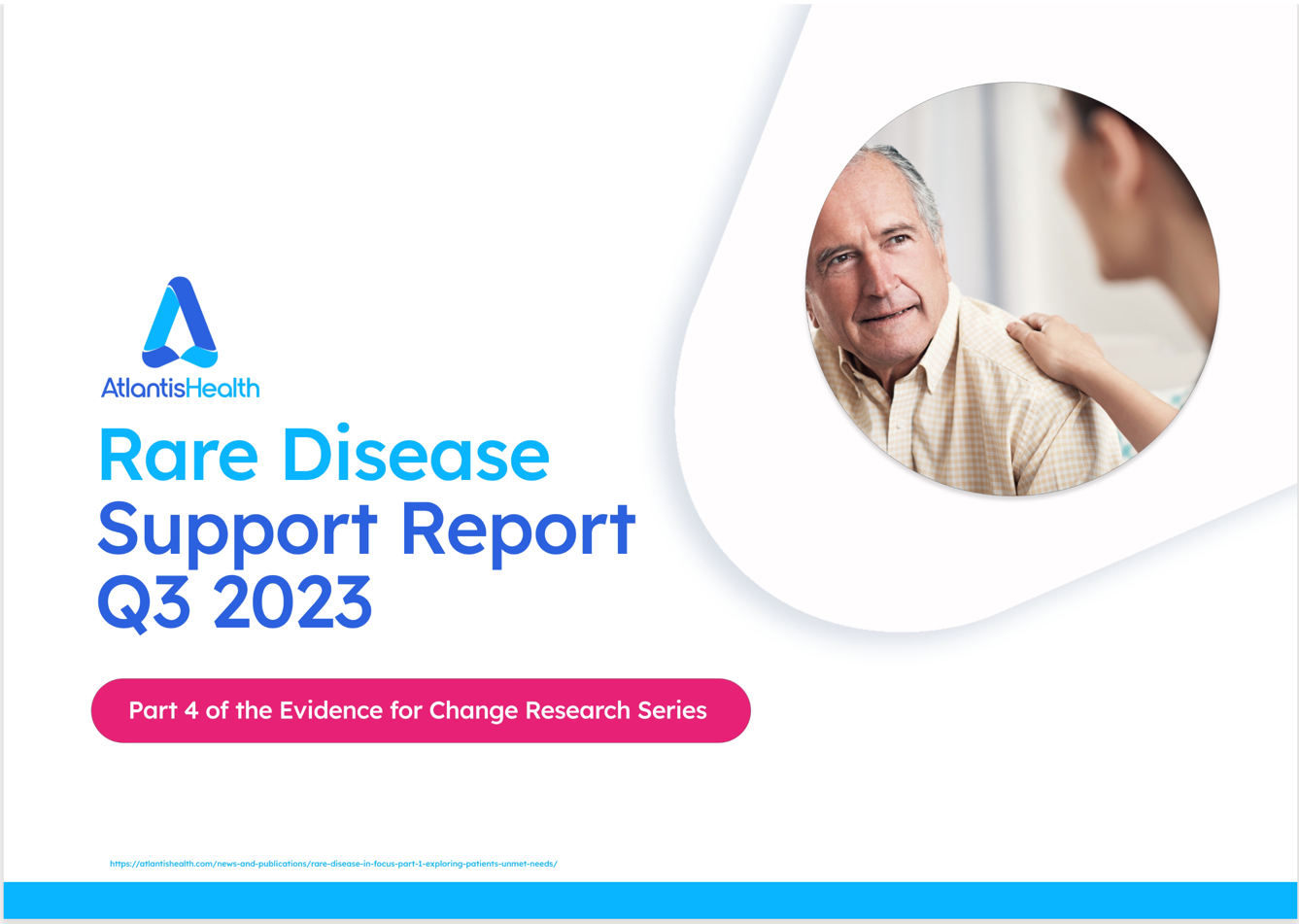Global research study investigates patient and caregiver awareness of and enrolment in rare disease support programmes, services and organizations

Summit, NJ, September 13, 2023 – Atlantis Health, a leading global patient agency specialising in the latest behavioural science, today announced it has officially released the Atlantis Health Rare Disease Support Report, which found that people living with rare diseases and their caregivers have low awareness of and enrolment in pharma-sponsored support programmes. As a result, they may be missing out on both emotional and practical support such as medication reminders that they could be getting. However, the report also reveals that caregivers and nurses are likely the key to improving rare disease patient support program enrolment levels.
Low Awareness of Pharma-Sponsored Patient Support Programmes vs. Support Organisations
The report found that only 33% of people living with rare diseases and 31% of their caregivers on average worldwide were aware of pharma-sponsored patient support programmes and services. This was significantly lower than their awareness of relevant rare disease support organisations, which was 67% for patients and caregivers on average. The difference in awareness levels indicates the need for pharmaceutical companies and rare disease startups to better promote their rare disease patient support programmes, especially in Germany and the UK where average patient awareness levels were only 0% and 12% respectively.
Higher Enrollment in Pharma-Sponsored Patient Support Programs by Caregivers vs. Patients
A new and important finding of the Atlantis Health global rare disease support research study was that 71% of caregivers who were aware of pharma-sponsored support programmes or services enrolled in them compared to only 54% of people living with rare diseases. So, increasing awareness with rare disease caregivers may hold the key to increasing enrolments in pharma-sponsored rare disease patient support programmes.
However, the report found that rare disease caregivers in the US were 52% less likely to be aware of pharma-sponsored patient support programmes than people living with the rare diseases themselves. This was also true in Australia where rare disease caregivers were one-third less likely to be aware of pharma-sponsored patient support programmes. These findings indicate a clear opportunity for pharmaceutical companies and rare disease startups to more actively promote their rare disease patient support programmes to caregivers, especially in the US and Australia.
Tapping into Nurses vs. Primary Healthcare Providers for Practical and Emotional Support
The report also found that 44% of people living with rare diseases and 20% of caregivers in the US, UK and Germany received additional support services from a nurse separate from their primary healthcare provider. So, it is important that pharmaceutical companies and rare disease startups include nurse delivered support through the digital patient support programs they offer to provide a more complete solution to people living with rare diseases and their caregivers.
Rare Disease Support Implications
The main implications of this report are that living with a rare disease can place significant demands on both patients and their caregivers. Our research demonstrates that both are seeking additional support to help manage these demands – whether medical, practical, and/or emotional.
The promising aspect of this report is that people living with rare diseases and their caregivers can get more support than many of them do today if they enrol in pharma-sponsored patient support programmes and get support from nurses as well as their primary healthcare providers. So, the key takeaway is that pharmaceutical companies can help facilitate better rare disease support by more actively promoting their PSPs to caregivers, who are more likely to enroll, and by enabling nurses to provide support through their digital patient engagement programmes.
“Rare diseases are serious, often chronic and progressive diseases that require ongoing support for both people living with the disease and their caregivers,” said Jonny Duder, CEO of Atlantis Health. “Our new global research study shows that they may be missing out on support they could be getting because of low awareness and enrolments in pharma-sponsored rare disease support programmes unless caregivers and nurses are brought into the solution.”
About the Atlantis Health Rare Disease Support Report:
- Purpose of the global research report: determine the support needed for people living with rare diseases and their caregivers
- Global study with participants from USA, UK, Germany, and Australia
- Surveyed 72 people living with rare diseases and 45 caregivers
- A wide range of rare diseases were represented including genetic and non-genetic conditions, cancers, and autoimmune conditions
- Study completed and released Q3 2023
- You can access our new report below
About Atlantis Health
As a global patient agency and strategic partner to pharmaceutical and life sciences companies, Atlantis Health co-designs and delivers personalised patient engagement solutions using the latest behavioural science.
Atlantis Health helps clients achieve better outcomes with behavioural science including:
20% average increase in treatment adherence
80%+ patient retention over time
80%+ average satisfaction
For 25 years, we’ve helped pharmaceutical and life science companies dramatically improve new product launches, medication adherence and health outcomes by designing and delivering personalised patient engagement solutions with our leading behaviour change strategies, techniques and technology.
Media Contacts:
United Kingdom
Niamh Ward
Tel: +44 20 8747 4360
Email: info.UK@atlantishealth.com
United States of America
Amy Parke
Tel: +1 908 988 2351
Email: info.US@atlantishealth.com
Germany
Yvonne Rothmund
Tel: +49 69 219 7660
Email: info.DE@atlantishealth.com
Australia & New Zealand
Nathan O’Donnell
Tel: +61 2 8396 9200
Email: info.AU@atlantishealth.com
